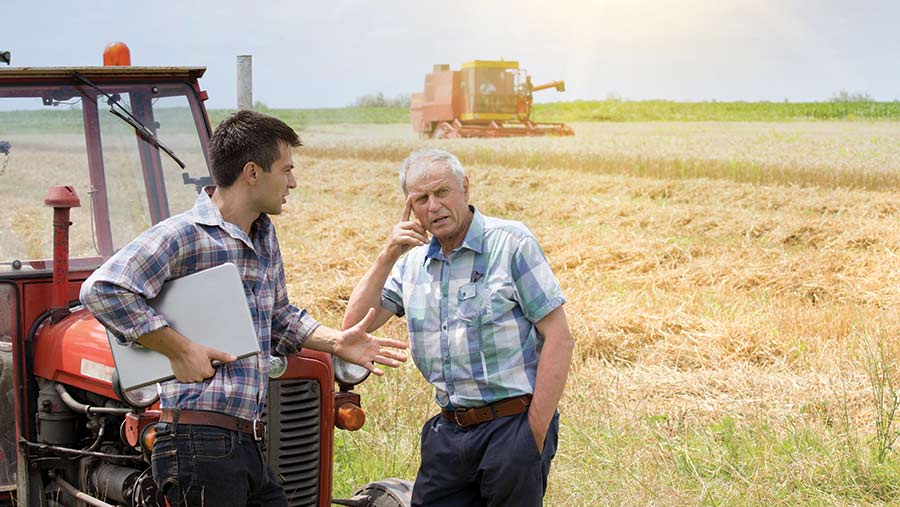How a second house can be added to farm in a succession plan
 Budimir Jevtic/stockadobecom
Budimir Jevtic/stockadobecom Adding a second house to a farm as part of succession procedures can be made easier in Wales by a little-known planning exemption.
The Welsh government introduced Technical Advice Notice (TAN) 6 Planning for Sustainable Rural Communities in 2010 to tackle rural depopulation and encourage younger people to remain in the community.
Under the transfer of management planning policy exception included in the notice, one additional house may be added to existing farms to help the business be transferred to the next generation.
See also: Joint ventures compared and how they can solve succession
The government hopes this will mean younger people will be more likely to take on agricultural businesses and ensure they continue to thrive in the context of an ageing farming community.
The National Planning Policy Framework in England has a similar provision for rural workers, which includes those taking control of a farming business.
How does the Welsh system work?
The clause is designed to make the planning permission process simpler for new dwellings in rural areas.
To use the transfer of management exemption, the younger person must be the decision-maker and have majority control over the farm business, which can be achieved in multiple ways depending on the individual circumstances.
One route could be through the farm business, such as changing who takes on responsibilities and financial rewards and liabilities in a partnership or limited company.
Another option could be to secure the management role through the granting of control of the farm by means of a tenancy or contract agreement, or indeed their complete transfer of ownership to the younger person.
It must be demonstrated that the management successor is critical to the continued success of the farm business and the need cannot be met in any other reasonable way.
There must be secure and legally binding documents provided to demonstrate that management of the farm business has been transferred to a person younger than the current responsible party.
Alternatively, it must be shown that transfer of management is only conditional upon grant of planning permission for the dwelling.
It is accepted that the existing dwelling could be occupied by a person who would, following the transfer of management responsibilities, no longer play a major functional role in the enterprise, and may progress towards retirement.
Where all the criteria are met, the local planning authority should ensure the new dwelling is legally tied to the holding.
Is it working?
The use of transfer of management agreements was covered in a report written by Jeremy Moody of the Central Association of Agricultural Valuers for a consortium of organisations, including the Prince’s Countryside Fund and the Royal Agricultural University.
Retirement Housing for Farmers in the United Kingdom (2019) states there was a general lack of awareness of the second dwellings policy at first and some local planning authorities appeared reluctant to accept it – as was the case initially for Class Q permitted development rights in England.
However, further guidance issued by the Welsh government resulted in wider use.
Under TAN 6’s policy for farm succession, 14 applications were made across Wales in 2016/17 and all were granted permission.
Cumulative figures show 122 applications were made between July 2010 and March 2017, of which 108 were granted and 14 refused – an 88.5% success rate.
Stemming rural depopulation
Ieuan Williams, associate at Reading Agricultural Consultants, said Welsh farms are generally about half the size of those in England, with 80% of Welsh farmland being in less-favoured areas.
There is a heavy reliance on support payments, which comprise on average 80-90% of farm profits.
“Part of the purpose of the TAN update was to try to stem rural depopulation in the more isolated areas of Wales where the younger farming generation was disinclined to remain on the family farms, partly due to lack of housing options, but also low potential incomes as family labour,” Mr Williams said.
“It has taken a while to be considered in many agricultural dwelling applications, largely through lack of knowledge of the exception by agents who are not specialised in this area of planning.”
Applicants should seek advice from a lawyer and accountant, he advises, to ensure the agreements are fit for purpose and there are no negative tax implications.
“In theory, the exception clause should make it much easier to gain planning permission for a second dwelling on a farm, but approval rates vary significantly between authorities,” Mr Williams said.
“It’s a useful tool, not only for planning, but also as an aid to formalising the farm succession and business handover, but only if it is done for the right reasons.”
Pros and cons
Benefits:
- Makes it easier for smaller family farms to gain planning permission for an additional dwelling
- Helps farm business survive
- Eases transition to the next generation
- Makes agricultural career more attractive for the younger party
- Younger person better able to introduce new ideas to running of farm
Pitfalls:
- Using it to circumvent planning system could lead to long-term difficulties because the agreement is a legally binding document
- Farmers may be reluctant to pass over management control to an individual, especially if they have multiple children to consider
- Parents may find it difficult to let go of the reins
Source: Ieuan Williams
